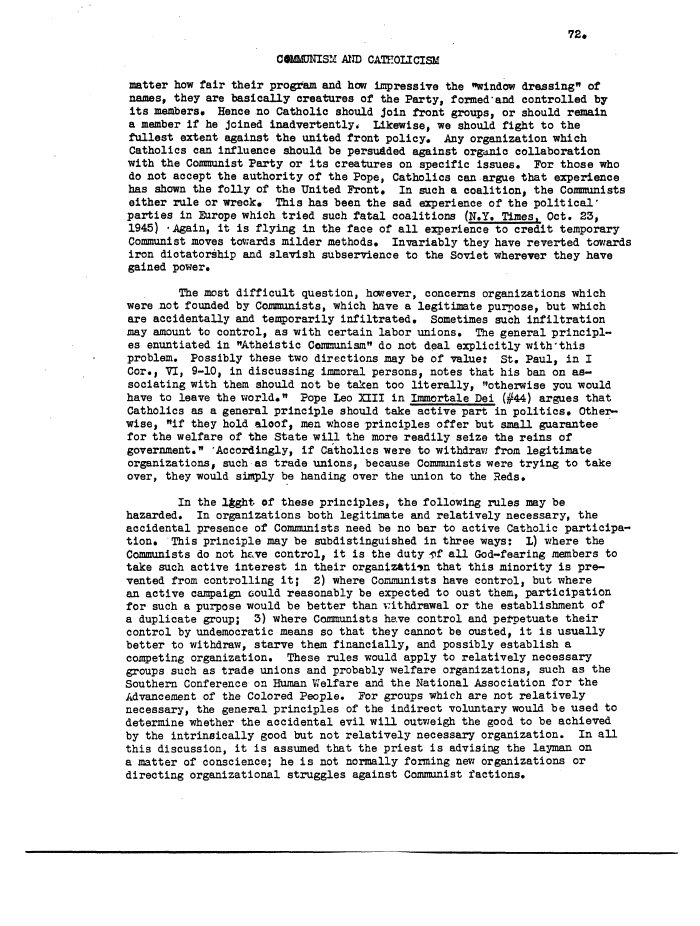 |
||||
 |
||||
| 72* C«MMDNIS!£ AND CATHOLICISM matter how fair their program and how impressive the "window dressing* of names, they are basically creatures of the Party, formed*and controlled by its members. Hence no Catholic should Join front groups, or should remain a member if he joined inadvertently. Likewise, we should fight to the fullest extent against the united front policy. Any organization which Catholics can influence should be persudded against organic collaboration with the Communist Party or its creatures on specific issues. For those who do not accept the authority of the Pope, Catholics can argue that experience has shown the folly of the United Front. In such a coalition, the Communists either rule or wreck. This has been the sad experience of the political' parties in Europe which tried such fatal coalitions (N.Y. Times, Oct. 23, 1945) -Again, it is flying in the face of all experience to credit temporary Communist moves towards milder methods. Invariably they have reverted towards iron dictatorship and slavish subservience to the Soviet wherever they have gained power. The most difficult question, however, concerns organizations which were not founded by Communists, which have a legitimate purpose, but which are accidentally and temporarily infiltrated. Sometimes such infiltration may amount to control, as with certain labor unions. The general principl- es enuntiated in "Atheistic Communism" do not deal explicitly with'this problem. Possibly these two directions may be of value: St. Paul, in I Cor., 71, 9-10, in discussing immoral persons, notes that his ban on as- sociating with them should not be taken too literally, "otherwise you would have to leave the world." Pope Leo XIII in Immortale Dei (#44) argues that Catholics as a general principle should take active part in politics. Other- wise, "if they hold aloof, men whose principles offer but small guarantee for the welfare of the State will the more readily seize the reins of government." 'Accordingly, if Catholics were to withdraw from legitimate organizations, such as trade unions, because Communists were trying to take over, they would simply be handing over the union to the Reds. In the l&ght of these principles, the following rules may be hazarded. In organizations both legitimate and relatively necessary, the accidental presence of Communists need be no bar to active Catholic participa- tion. This principle may be subdistinguished in three ways: L) where the Communists do not have control, it is the duty ?f all God-fearing members to take such active interest in their organization that this minority is pre- vented from controlling it; 2) where Communists have control, but where an active campaign could reasonably be expected to oust them, participation for such a purpose would be better than vrithdrawal or the establishment of a duplicate group; 3) where Communists have control and perpetuate their control by undemocratic means so that they cannot be ousted, it is usually better to withdraw, starve them financially, and possibly establish a competing organization. These rules would apply to relatively necessary groups such as trade unions and probably welfare organizations, such as the Southern Conference on Human Welfare and the National Association for the Advancement of the Colored People. For groups which are not relatively necessary, the general principles of the indirect voluntary would be used to determine whether the accidental evil will outweigh the good to be achieved by the intrinsically good but not relatively necessary organization. In all this discussion, it is assumed that the priest is advising the layman on a matter of conscience; he is not normally forming new organizations or directing organizational struggles against Communist factions. |